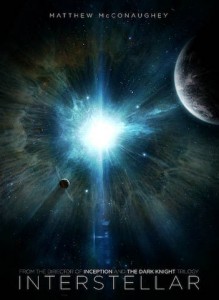“Interstellar” is a beautiful, epic and slightly-obtuse film that anyone who doesn’t hate sci-fi needs to see for themselves. Christopher Nolan, the same director responsible for the “Dark Knight” trilogy, “Inception,” “The Prestige,” “Memento” and a handful of others, pilots “Interstellar” as well as anyone could.
Matthew McConaughey is our protagonist, a farmer and former NASA pilot on a dying planet Earth.
His character, Cooper, is close with his children and wants the best for them, but crops are dying and food supplies are diminishing, turning the U.S. into a post-modern dust bowl.
Growing food has taken priority over space exploration, which explains Cooper’s career shift.
The exposition of the plot is lengthy but well-done, and in typical Nolan fashion the cinematography is on point.
Actual dust bowl survivors are brought on screen in documentary style to describe what it’s like to sweep dust from countertops every day and to set dishes out upside-down before dinner so they don’t collect the dirt precipitating from the air.
The audience is given a good feel for what it’s like to live in such an environment.
Cooper is selected by NASA, in a convoluted way, to be part of a mission involving a wormhole that has opened up near Saturn.
There are worlds on the other side of that portal, we are told, that might be able to support life better than Earth will in 20 more years.
So into the black beyond they go, but not before we’re shown a wrenching scene where Cooper is driving away from his kids with an expression on his face that I would rather not feel the roots of.
Anne Hathaway, Wes Bentley and David Gyasi accompany him in a literal rocket ship journey that spans years, and they alternate between cryo-sleep and wakeful research as the group angles toward Saturn.
Up until this point the movie is eye-catching and the dialogue is engaging, but the actual exploration aspect of space is when the story really starts to grab us.
Faced with disasters and decisions that could affect whether or not our heroes ever return home—and whether they succeed in their world-saving mission or not—the tension builds in ways that I have only seen Nolan accomplish.
The visual effects are stunning and the organ music adds a spiritual feel to the cosmic backdrop.
A common take on the film’s score is that Hans Zimmer is a great composer, but perhaps at a more normal volume—seemingly independent of screening venue and location, the sound was just over-modulated.
Add in microphone filters to make it sound like the characters are talking in space helmets over two-way radios, and you’ve got a recipe for forgettable conversations and wasted dialogue.
Nolan has since addressed the sound issues and they ought to be fixed before the DVD and Blu-Ray release in a couple of months, to the relief of many.
Through over two and a half hours of sweeping visuals, soaring music, and emotional tugs, the plot wraps up in a way that surprised me and, therefore, I won’t disclose here.
But to conclude my own take on the film, I would say that it’s well-worth a $10 movie ticket.
This is a feather in Nolan’s cap, and although it falters under its own weight at times the superb acting from McConaughey and direction from Nolan come together to create something truly wonderful.
























